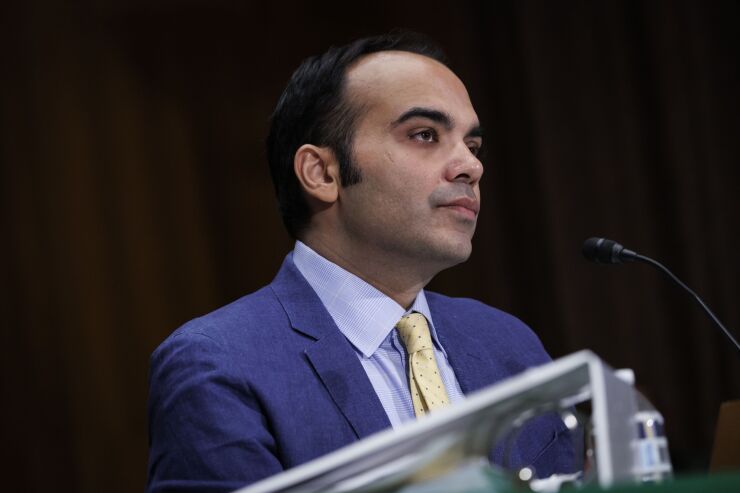
The Consumer Financial Protection Bureau on Monday issued a policy statement redefining what constitutes an "abusive" act or practice, a standard that has vexed banks and financial firms since it was introduced in the Dodd-Frank Act.
The
The CFPB has defined abusive conduct as behavior that generally obscures important features of a product or service, or takes unreasonable advantage of a consumer by leveraging certain circumstances such as gaps in a consumer's understanding of the product's terms, or a consumer's reliance on a company to act in their best interest.
"It's already the law," said CFPB Director Rohit Chopra, who spoke Monday at a virtual event at the University of California Irvine, where he discussed the policy statement for 50 minutes. "It's important that we not lose sight of the fact that our law reflects our country's values. One way that Congress made a value judgment is by banning conduct that essentially tricks people."
Abusive behavior can include "the use of dark patterns, set-up-to-fail business models like those observed before the mortgage crisis, profiteering off captive consumers and kickbacks and self-dealing," the bureau said. The CFPB also said that in the past it has fined companies for abusive conduct without defining it, instead building legal precedent through enforcement actions. The CFPB said it has brought 43 cases for
Chopra described how companies may use "digital dark patterns," which are online tricks or checkboxes that obscure, manipulate consumers "into making choices they otherwise would not have made."
"Digital dark patterns are new in the sense that they leverage contemporary technology to confuse people, but ultimately they involve the same type of obscuring that Congress has long been concerned about," he said. "Manipulating people is wrong, whether on paper or through pixels."
The Dodd-Frank Act gave the CFPB the authority to punish firms for violating the longstanding federal prohibition on "unfair" or "deceptive" acts or practices and introduced a new "abusive" standard, collectively known as UDAAP violations. Congress banned abusive conduct in consumer financial markets in response to predatory mortgage lending practices that led to the financial crisis of 2008.
The current definition of abusive differs dramatically from the CFPB's guidance issued in 2020 under the Trump administration, which was
The CFPB's previous abusive policy statement "spelled out what the CFPB would not do," Chopra said, adding that it "really wasn't providing a rigorous or analytical approach to business practices."
Under Chopra, the CFPB provided an analysis of the Consumer Financial Protection Act's definition of abusive conduct. The bureau also summarized past precedent and background on the policy statements issued by the Federal Trade Commission on unfair and deceptive practices prohibitions.
The CFPB is providing a 60-day comment period and will accept public comments through July 3.






